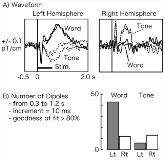OUTCOME DATA OF ANTERIOR MEDIAL TEMPORAL LOBE RESECTION AT TERTIARY CARE COMMUNITY HOSPITAL
Abstract number :
2.476
Submission category :
Year :
2005
Submission ID :
5785
Source :
www.aesnet.org
Presentation date :
12/3/2005 12:00:00 AM
Published date :
Dec 2, 2005, 06:00 AM
Authors :
Joshua R. Anderson, Nazih Moufarrij, John Gorecki, and Kore Liow
Anterior Medial Temoral Lobe Resection (AMTR) is a procedure widely performed for refractory mesial temporal lobe epilepsy syndrome at tertiary care university-based medical centers. However, increasingly, more tertiary non-university-based community hospitals or university affiliated community hospitals are performing these procedures. There is little available outcome data for AMTR performed at community hospitals. Retrospective chart review performed on 33 patients who underwent AMTR at the 945 bed tertiary care Via Christi Regional Medical Center in Wichita, Kansas from 2002-2003. All patients were worked up at the Comprehensive Epilepsy Center including Video Epilepsy Monitoring, Specialized Epilepsy Magnetic Resonance Imaging Protocol, FD Glucose Positron Emission Tomography Scans, Intracarotid Amobarbitol Testings, Intracranial Recording by fellowship-trained epileptologist. Neurosurgeon was performing AMTR at academic institution prior to praticing at community hospital. The patient population of 33 people included 16 males and 17 females averaging 32 years of age. All had complex or simple partial seizures. Patients had waited for an average of 20 years before being referred to epilepsy center for surgical evaluation. Patients had failed a average of 3.7 seizure medications, and they were on 2 seizure medications at the time of surgery, and had avarage of 17.9 seizures/month prior to surgery. 21 patients had Magnetic Resonance Imaging (MRI) abnormalities with 11 mesial temporal sclerosis noted. 17 patients had right sided resection while 16 right sided resections. Post-operatively, 31 of 33 (93%) patients had Engel Class I surgical outcome at average follow up duration of 6 months . 30 of 33 (90%) patients are gainfully employed or attending school/college as of last clinic follow up. 27 of the 31 (87%) adult patients who were not able to drive before surgery are now driving. Surgical complications included 1 chronic aphasia, 1 venous infarct in the posterior cerebral artery distribution and 1 scalp infection. AMTR epilepsy surgery performed at tertiary care community hospital in Kansas by fellowship-trained epileptologist and neurosurgeon shows comparable favorable outcome.[figure1] (Supported by Via Christi Comprehensive Epilepsy Center, Wichita, Kansas.)
